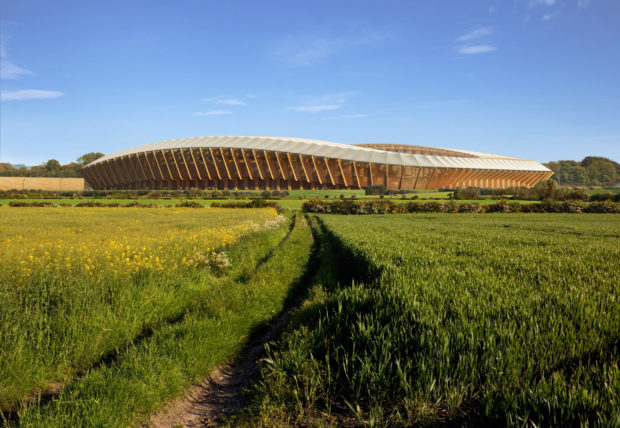Zaha Hadid Architects to build groundbreaking wooden football stadium

The football stadium, which will be entirely built of wood, is to be designed by Zaha Hadid Architects. Image: courtesy of Zaha Hadid Architects via AFP Relaxnews
The office of the late architect Zaha Hadid has obtained a building permit for a wooden football stadium, the first of its kind in the world, to be located in Gloucestershire, England.
Designed by Zaha Hadid Architects, Eco Park Stadium, the future home of Forest Green Rovers Football Club, will be the first-ever football stadium to be made entirely of wood. In addition to maintaining the meadow landscape of the site, the stadium will use low-emissions construction methods and be built from sustainable timber.
Among the goals set for Forest Green Rovers’ Eco Park Stadium is the provision that it should be carbon-neutral or even carbon-negative with the production of renewable energy on-site, and that it should demonstrate that sustainable architecture can be aesthetically pleasing.
https://www.instagram.com/p/B6P71nvh2hA/
Online architecture magazine Dezeen reports that this was the second attempt to obtain a building permit for the 5,000-seat wooden stadium. An original proposal was rejected in June 2019. The revised version of the project features an all-weather pitch, and a different landscaping strategy to better compensate for the loss of green fields at the site.
Dezeen adds that Japanese architect Kengo Kuma’s New National Stadium in Japan, built for the Tokyo 2020 Olympic Games, is also made of wood but equipped with a steel canopy. Hadid’s original design for the Japanese project was scrapped amid controversy in 2015. Zaha Hadid Architects won the design commission for the Eco Park Stadium in 2016, which was the year of Hadid’s death.
Born in Baghdad in 1950, Hadid launched her own agency at the age of 29, after initially working with architect Rem Koolhaas. She was the first woman to receive the Pritzker Prize for Architecture, one of the profession’s most prestigious awards. IB/JB
RELATED STORIES:
Getting recommended amount of physical exercise linked to lower risk of 7 cancers
What to do post-run to maximize your results